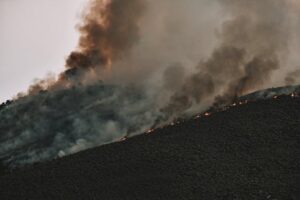Physical Address
23,24,25 & 26, 2nd Floor, Software Technology Park India, Opp: Garware Stadium,MIDC, Chikalthana, Aurangabad, Maharashtra – 431001 India
Physical Address
23,24,25 & 26, 2nd Floor, Software Technology Park India, Opp: Garware Stadium,MIDC, Chikalthana, Aurangabad, Maharashtra – 431001 India

A new study published in the journal Nature Climate Change has found that climate change increased global burned area almost by 16%. The study highlights that the decline in global burned area caused by land-use changes throughout the 20th century has been largely offset by the growing impact of global warming. Researchers found that while human-induced land-use changes reduced the area burned by wildfires by 19%, this has been countered by a 16% increase driven by global warming, leaving a net decline of just 5% over the last century.
The study reveals that, despite an overall decline in global burned area, climate change has caused significant regional increases in wildfire activity. Burned areas have risen by 29% in southeastern South America, 22% in northern Australia, 18% in west Siberia, and 15% in western North America due to hotter and drier conditions.
“The simulations show that climate change increased global burned area by 15.8% (95% confidence interval for 2003–2019 and increased the probability of experiencing months with above-average global burned area by 22%. In contrast, other human forcings contributed to lowering burned area by 19.1% over the same period. Moreover, the contribution of climate change to the burned area increased by 0.22% per year globally, with the largest increase in central Australia,” the researchers wrote in the study.
Earlier, a “rapid attribution” study by World Weather Attribution (WWA) found that climate change has increased the likelihood of Australia experiencing extreme weather conditions, like those leading to the 2020-21 wildfires, by at least 30% since 1900.
The study is the first to directly assess how both land-use changes and climate change have influenced global wildfire trends. Changes like forest fragmentation and conversion of land for agriculture and urban development have suppressed fires in some regions. However, rising temperatures and increasingly dry conditions have expanded burned areas, particularly in regions like South America, Australia, Siberia, and North America.
The study’s co-author, Seppe Lampe, and other experts noted that while climate change has intensified wildfires, land-use changes—such as the transformation of savannahs into cropland—have suppressed fires, particularly in tropical regions. Researchers warn that these findings could inform policymakers on fire risk management, emphasizing the need for improved planning and early warning systems to prepare for future fire seasons.
Earlier, a study published in Nature Geoscience had highlighted the alarming impact of fires on global carbon sinks, particularly as global temperatures rise toward 1.5°C. The research showed that fire regimes are intensifying in vulnerable ecosystems such as boreal forests and tropical regions, where fires release vast amounts of stored carbon into the atmosphere, further accelerating climate change. As fire-prone areas expand, the capacity of these regions to act as carbon sinks is being severely diminished, posing a critical challenge to efforts aimed at limiting global warming. (For more details, here is a link to a CFC report on the study.)
Social media also has been rife with various posts spreading misinformation about wildfires with most trying to establish that a rise in wildfires has no connection with a changing climate. CFC India has earlier debunked such false claims. Read here.
References:
https://www.nature.com/articles/s41558-024-02140-w
https://www.worldweatherattribution.org/bushfires-in-australia-2019-2020
Climate change almost wipes out decline in global area burned by wildfires
https://www.nature.com/articles/s41561-024-01554-7
Inferno Ahead: The Rising Threat of Wildfires in a Warming World
Climate Change contributing to Wildfires becoming more frequent and intense
Banner Image: Photo by Tim Mossholder on Pexels